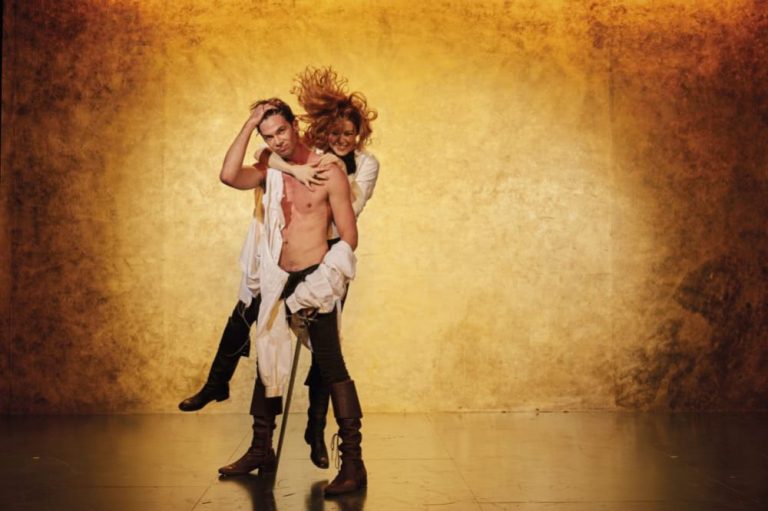With two Helpmann Awards to his name and standing at the helm of respected theatre company Belvoir, Eamon Flack knows a great talent when he sees one. When it came to meeting Australian-born and London-based actor and dancer Kiruna Stamell, Flack didn’t need a second thought about getting her involved in his next project.
“He saw me while I was performing at the National Theatre in London,” says Stamell, who has relocated back to Sydney on a temporary basis to complete her Belvoir commitments. “He didn’t even know I was Australian until I opened my mouth and he heard the accent! We met for coffee the next time in town, and then he was in touch with my agent back in Australia – and that was that.”
Stamell is now part of the cast for Flack’s production of The Rover, a play from the 1600s by the enigmatic Aphra Behn. She plays the role of Callis, a governess to two sisters – Florinda and Hellena – and is joined in the cast by Taylor Ferguson, Gareth Davies and Elizabeth Nabben. For Stamell, it’s a mix of actors she knows well and first encounters – all of whom are gelling quite nicely together.
“I met Toby [Schmitz] and Leon [Ford] before I originally left Australia about ten years ago,” she says. “It’s funny – I met them at the start of their careers, when they were still in that early stage. I’ve been overseas, but I’ve had connections and friends still back here that have been keeping an eye on things. They’ve gotten to see how far people like them have come – and now, in this weird reunion of sorts, I get to see it for myself.”
While based in the UK, Stamell has found work on shows like Warwick Davis’ Life’s Too Short, as well as a role in a touring production of an original revue, For All The Wrong Reasons. It’s work Stamell is incredibly proud of, given the frequent sidelining and adversity that people with disabilities – and, by extension, little people – face when pursuing a career in the arts.
There are a lot of things I love about this country – I just wish there was more work for me here.
Having said that, she is excited to be onstage in her island home once again. “I’m stoked to be back working for a bit,” she says. “There are a lot of things I love about this country – I just wish there was more work for me here.”
As Stamell takes our call, she is taking a quick break from rehearsals for The Rover. With the curtain set to part in just over two weeks from the time of the interview, intensity levels are rising. Stamell is constantly fascinated by the process of character development – thinking out loud on the subject, she pauses momentarily before setting up an analogy for her understanding of what it will be like taking to the stage as Callis. “You know the way how you and I are having a conversation right now?” she begins. “I don’t necessarily know what I’m going to say to you next.
“You kind of learn to forget the text. You think of the words as if it’s a conversation for the first time – and you don’t know which way it’s going to go, because you’re on the journey to the audience. You rehearse to forget, in a way. You have to know something well enough to not know it.
“I know it seems like a bizarre thing to say, but it’s the same in the world of dance. If you’ve ever learned a couple of dance steps, you get to a point where you’re not reciting them – you’re living them. It’s kind of like that. Every time you look at it or explore it, you learn something different. It’s always new – you’re always throwing a ball back and forth between one another, and it’s never exactly the same.”
Originally performed in 1677, The Rover has had countless reinterpretations and adaptations from major theatre companies and small troupes across the world. As far as Stamell is concerned, there is concrete evidence as to why this play has survived for centuries after it was first written.
“There is so much room for interpretation,” she says. “It’s really nice to see this classic work being played with and being kept alive, rather than doing something that’s cut-and-paste or by the book. I feel like, back in the ’80s, there were a lot more rules with older works like Shakespeare – it was like, ‘This is how it’s done.’ It had to be technically and academically correct. I feel like I could do a completely different production of The Rover – even though the text is the same, it would be a totally different experience.”
It’s really nice to see this classic work being played with and being kept alive.
Stamell has also made the most of her time in Australia with a much-debated appearance on ABC panel show Q&A, in which she openly discussed the struggles faced by Australians with disabilities. Since it aired, Stamell’s inbox has overflowed and her phone has more or less rung off the hook.
“The conversations I’ve had after doing that was some of the best correspondence I’ve ever received,” she says. “The response has been so eloquent and thoughtful. It’s a very gratifying thing to come off the back of the issues I was discussing. It was incredibly touching.”
Photo: Daniel Boud
The Rover plays at Belvoir St Theatre from Saturday July 1 – Sunday August 6.


































